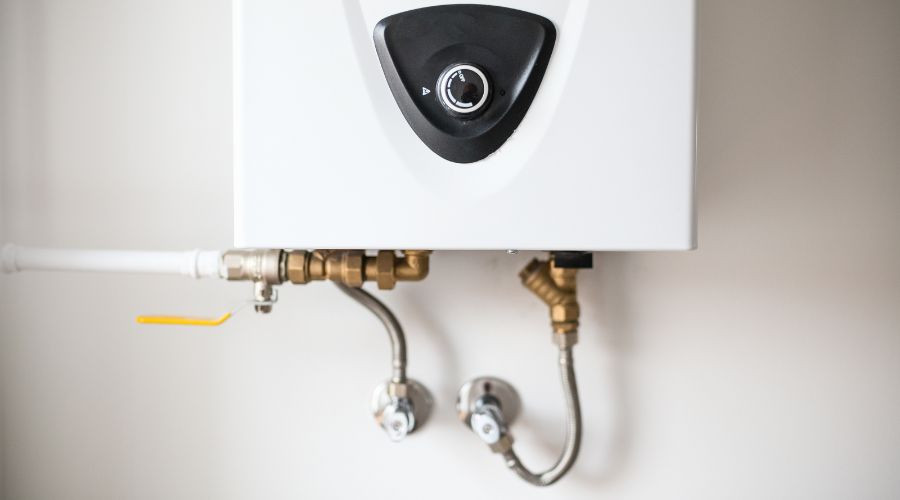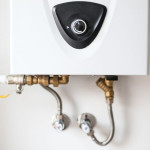How Boiler Services Help Keep Homes Warm in the Winter
While not as common as other forms of central heating, such as furnaces, boilers are making a comeback in American homes. After all, boilers are energy efficient and highly effective at keeping the place warm – so it’s only natural that boiler installation is on the rise. But how much do homeowners know about their boilers?
Knowing how a boiler works and how to maintain it can be beneficial for several reasons. Homeowners can spot signs of trouble early on, improve their boiler’s energy efficiency, and ensure the unit lasts as long as possible. So, before winter arrives in full force, here’s a brief guide to boilers and boiler maintenance!
The Basics of Boilers
 First, it’s helpful to understand a few boiler basics. Boilers can be classified by many variables, including the fuel type, whether they use hot water or steam to distribute heat throughout the home, their size, and their heating capacity. But no matter the type, every boiler operates on the same basic principles.
First, it’s helpful to understand a few boiler basics. Boilers can be classified by many variables, including the fuel type, whether they use hot water or steam to distribute heat throughout the home, their size, and their heating capacity. But no matter the type, every boiler operates on the same basic principles.
Inside the boiler, heat is produced using combustible fuel or electricity and then transferred to a volume of water via a heat exchanger. The water (or steam) is then pumped to the terminal units around the home. These terminal units may be radiators, fan convectors, or radiant heat systems (most commonly used for heated floors). After its heat is dispersed into the room via the terminal unit, the water heads back to the boiler to be heated again.
Boilers are distinguished from forced-air heating systems primarily by their superior energy efficiency. Very little heat energy is lost on the way from the boiler to the rooms to be heated, so homeowners get more bang for their buck when heating. Boilers also tend to be quieter and more compact than standard furnaces, require less maintenance, and generally last longer.
Common Boiler Issues to Watch Out For
Boilers have very few mechanical parts, so they tend to be very reliable and durable, but they can still develop issues from time to time, especially as they get older (in the 15-20-year range). Fortunately, homeowners who know what to look for can call for boiler repair before the problem worsens and they lose heat entirely. Here are some common warning signs of boiler problems:
- The home isn’t getting warm enough. If only one room is affected, the terminal unit in that room is likely the issue, but if the whole house is affected, the boiler is the problem.
- The house takes longer to get warm than usual.
- Unusually high energy bills – indicate that the boiler is working harder than it should be.
- Strange sounds coming from the boiler, such as rattling or rumbling – may indicate a failing pump, mineral deposits in the water tank, or air bubbles in the system.
- Water is leaking from the boiler or the terminal units.
- Unusual odors around the boiler – burning smells may indicate faulty wiring or combustion issues, while a rotten egg smell may indicate a gas leak.
If homeowners notice these signs, they should call their preferred HVAC company to diagnose the issue. In most cases, these issues can be repaired, but depending on the extent and cost of the required repairs and the boiler's age, a boiler replacement may make more financial sense.
Tips for a More Efficient Boiler
 Boilers have excellent energy efficiency ratings but need little care and maintenance to ensure they operate at peak efficiency throughout the cold seasons. This is why it’s vital to schedule professional boiler maintenance once a year, preferably in the fall. Professionals perform a laundry list of tasks that help keep the boiler running smoothly and efficiently. However, regular boiler service visits also help mitigate wear and tear and allow technicians to identify and address problems before they cause too much damage.
Boilers have excellent energy efficiency ratings but need little care and maintenance to ensure they operate at peak efficiency throughout the cold seasons. This is why it’s vital to schedule professional boiler maintenance once a year, preferably in the fall. Professionals perform a laundry list of tasks that help keep the boiler running smoothly and efficiently. However, regular boiler service visits also help mitigate wear and tear and allow technicians to identify and address problems before they cause too much damage.
Between professional boiler tune-ups, homeowners can (and should) take matters into their own hands by tackling a few DIY boiler maintenance tasks, such as:
- Check the boiler water level and refill/drain if necessary.
- Check the boiler pressure level and adjust it as needed.
- Check that the pilot light flame is a solid blue color. If it’s yellow, flickering, or smoky, the homeowner should immediately call a professional for repair.
- Keep the area around the boiler clear. This ensures adequate airflow for the combustion and ventilation processes.
- Check the exhaust flue vents to ensure they’re clear and clean. A clogged flue vent can lead to carbon monoxide buildup.
- Flush the boiler to remove sediment once a year (typically included in professional maintenance, but homeowners can do it themselves if they choose).
- Bleed the radiators and fan convectors. This helps remove any air trapped inside the units and ensures they heat properly.
When tackling any maintenance task, homeowners should always follow the instructions in their boiler system’s owner’s manual. But if in doubt, they can always call a qualified professional! Regardless, keeping up with these boiler maintenance tasks will ensure the home stays nice and toasty all winter!
About AirLux Heating & Cooling
AirLux Heating & Cooling has been providing award-winning HVAC services to the Niles community for years. Their licensed, insured, drug-tested, and background-checked technicians always send notifications when they’re on their way and arrive in fully stocked trucks so they can get the job done right the first time. AirLux offers up-front pricing, flexible financing, 24/7 emergency service, a 3-year labor warranty, and a money-saving membership plan. So there’s no one better to call for heating services in Niles, MI!



